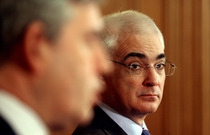 So here it is. After rumblings that Brown is prepared to set out spending cuts – rather than hiding them away in he small print of the Budget – Alastair Darling confirms the new strategy in an interview with the Times. He doesn’t actually use the word “cuts”, but it amounts to that:
So here it is. After rumblings that Brown is prepared to set out spending cuts – rather than hiding them away in he small print of the Budget – Alastair Darling confirms the new strategy in an interview with the Times. He doesn’t actually use the word “cuts”, but it amounts to that:
“‘As there is less uncertainty you can decide what your priorities are,’ he said. ‘This doesn’t mean you are going into some sort of Dark Age but we will have to decide, given what’s happened to the economy, how much we think we can afford to spend on services, how much we should be devoting to making sure we recover our fiscal position. That’s a judgment that I’m going to have to make at the Pre-Budget Report in the autumn.’
…
He said: ‘Once you start getting into recovery, then that is the time when you have to say “Now we need to start doing something about the deficit”. When you look at the burden of where the deficit reduction comes from, it is tax, yes, but it is also having much tighter public spending.'”
Intriguingly, given the shape of the public spending battle before now, Darling even “challenges” the Tories to set out how they’d cut spending too. It’s a slightly shameless demand, but one the Tories may have to meet: as Fraser’s political column highlights this week, Darling isn’t the only one who’d like to hear more about the Tories’ debt reduction plans. Although, if we take David Cameron’s recent interview with the Economist at face value, the Tories were planning to set out some fiscal “fine print” before the election, anyway.
For the time being, and City qualms aside, the Tories are in a much stronger political position than the government over this. You suspect that Brown’s bluster about “Labour investment vs Tory cuts” may have fatally undermined his party’s ability to be taken seriously on the public finances. And the very fact that it’s his spending, spending, spending which got us into this mess hardly inspires confidence about his willingness to cut back.






Comments